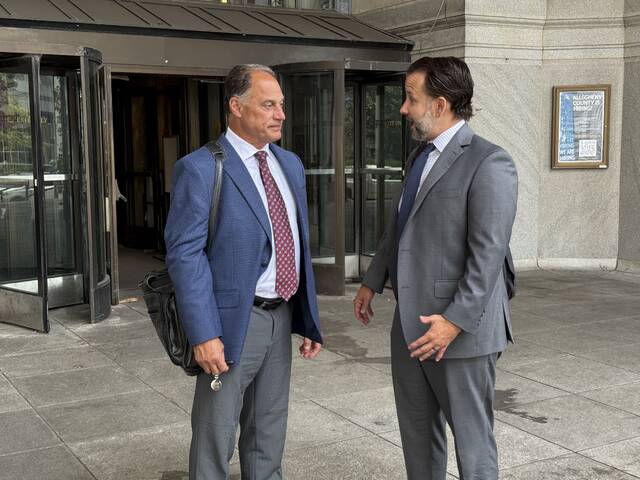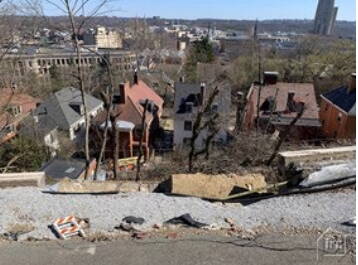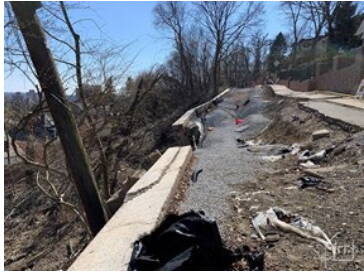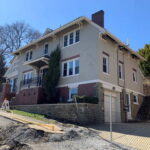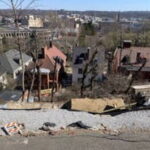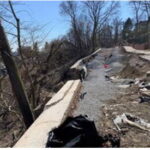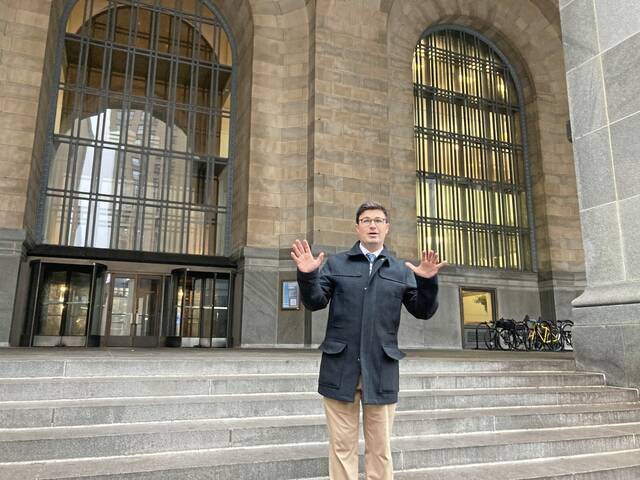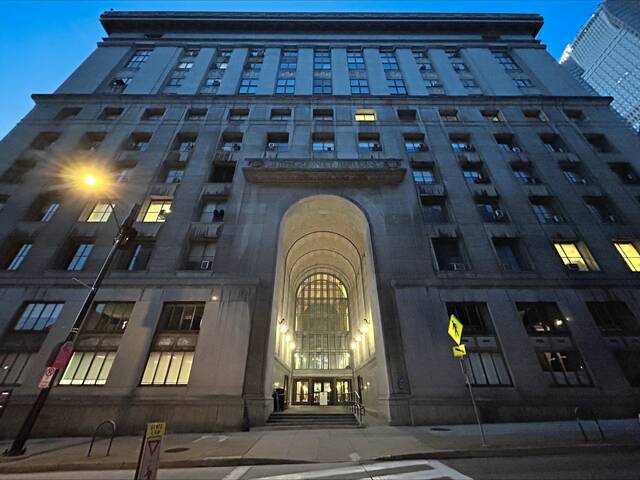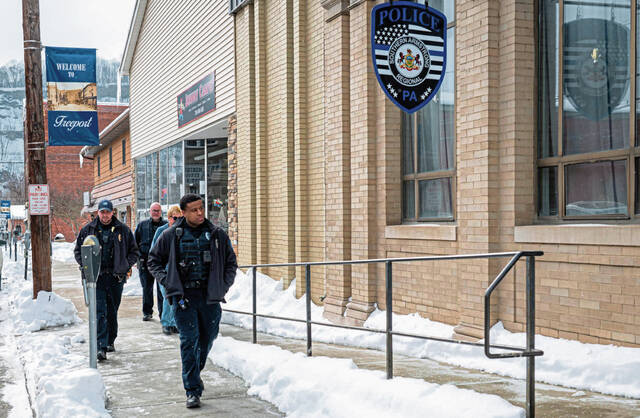When the street began pulling away from their house in Pittsburgh’s historic Schenley Farms neighborhood in March 2022, Brian and Donna Albert reported it to the city.
Over the following weeks, Pittsburgh officials determined a landslide was causing Andover Terrace to collapse and a retaining wall to fail.
The city closed off the street and sidewalk, and the Alberts haven’t had access to their property since April 2022.
In October, the state’s Commonwealth Court accused Pittsburgh of “strong-arm tactics” and agreed with the couple that the city’s actions amounted to a “de facto taking,” requiring that they be compensated for their home.
The city initially obtained an appraisal valuing the property at $730,000.
But now, Pittsburgh officials argue the city should be required to pay the Alberts less than half that amount, or $350,000.
Both sides appeared on Monday before Allegheny County Common Pleas Judge Mary C. McGinley for a hearing on the matter.
McGinley will issue a decision at a later date.
Eminent domain
The Commonwealth Court opinion lays out the details of the landslide and damage to the Alberts’ home in Schenley Farms, a historically significant 170-acre tract straddling the Hill District and Oakland near the University of Pittsburgh.
Pittsburgh tried to slow the landslide by removing pavement and underlying brick pavers and installing soil nails.
But by September 2023, the street level had sunk 20 feet.
To do the necessary work to the Alberts’ property, as well as others on the street, the city sought easements from the homeowners.
Initially, Pittsburgh officials sought voluntary cooperation instead of using eminent domain.
The homeowners refused, however, prompting the city to cite them for code violations “in an attempt to bully the owners into granting the easements,” the Commonwealth Court wrote.
Although the citations were dismissed, the owners still had to waste time and money to fight them, the court said.
Ultimately, the city used eminent domain to obtain the Alberts’ property in February 2023, paying them $26,000 initially.
However, when the Alberts went to the Allegheny County Board of Viewers to determine damages they were entitled to, the city objected.
Common Pleas Judge Michael Della Vecchia found in the Alberts’ favor, as did Commonwealth Court, which ruled that the city delayed stabilization efforts and failed to promptly seek funding for remediation — not doing so until its 2024 budget.
“Under the totality of the circumstances — the city’s complete denial of access to the Alberts’ property for several years, and with no definite end date in sight, along with serious structural damage to the house, and the city’s intentional delays and strong-arm tactics – the trial court properly concluded there was a de facto taking,” Commonwealth Court wrote.
Dickering over value
At Monday’s hearing, the city called as witnesses an appraiser and engineer. Brian Albert also testified.
According to the Alberts’ pre-trial statement, the couple bought the house as an investment property in 2018 for $410,000. They still owe about $143,000.
In the first few years of ownership, Albert told the court, the couple painted the interior and exterior, removed a concrete patio, replaced a retaining wall and added a garden wall.
He estimated they spent about $150,000 in upgrades.
“It was in great condition,” Albert said, adding later, “It was a wonderful house, beautiful.”
However, by late 2021, the couple — who were living in Elizabeth Township — had decided to sell the property so they could remain close to their daughter, who had recently gotten married and moved in just five minutes away.
They retained a local real estate firm and expected to list the house at around $750,000.
It was in early March 2022, though, that homeowners in the area began to report the street appeared to be separating from the sidewalk.
Albert testified that prior to the city taking possession of the home on March 21, 2022, there was no damage inside from the landslide.
But over ensuing months — as the city began to make repairs — cracks appeared.
At one point, Albert said, walls separated.
“You can see ivy growing into the house from outside,” testified Albert, who retired as vice president and general counsel for Oxford Development.
Albert’s attorney, Joshua Lyons, argued his clients are entitled to “estimated just compensation” of $730,000 — the value the city initially provided in an appraisal setting the property’s fair market value.
Since then, though, the city claims the value is significantly reduced.
‘Out of plumb’
On Monday, as part of its case, the attorney for Pittsburgh called Anthony Barna, who completed the two appraisals for the city, and Steven J. Bauer, a structural engineer who estimated the costs to repair the damage.
Bauer visited the house in August to conduct his evaluation but said he believed there was already damage from the landslide prior to March 2022 when the city took possession.
“It was notable how things were out of plumb,” Bauer said. “Slabs were not level.”
Bauer estimated the cost to repair the damages from the landslide could be $230,000.
Barna, the appraiser, testified that the city’s first request asked him to consider the value of the property “as if unaffected by the landslide.”
That value, he said, was $730,000.
But he was then asked to conduct another appraisal “as affected by the landslide.”
In his new report, dated Sept. 5, Barna set the value of the house at $350,000.
He cited the cost of potential repairs, as well as an estimated $150,000 loss from the stigma associated with the house being part of the landslide.
Assistant City Solicitor Kevin T. Freyder argued to the court that the city should be responsible for only the value of the property after the landslide had already damaged the house and reduced its worth.
The Alberts object to those figures, though, citing Pennsylvania law on condemnation that says damage resulting from a natural disaster “shall be excluded in determining fair market value of the condemnee’s entire property interest immediately before the condemnation. “
“Clearly, both the plain language and intent of the statute are meant to prevent exactly what the city proposes,” the Alberts’ attorneys wrote. “This court needs to put a stop to the city’s perseverating in its bad faith conduct.”


